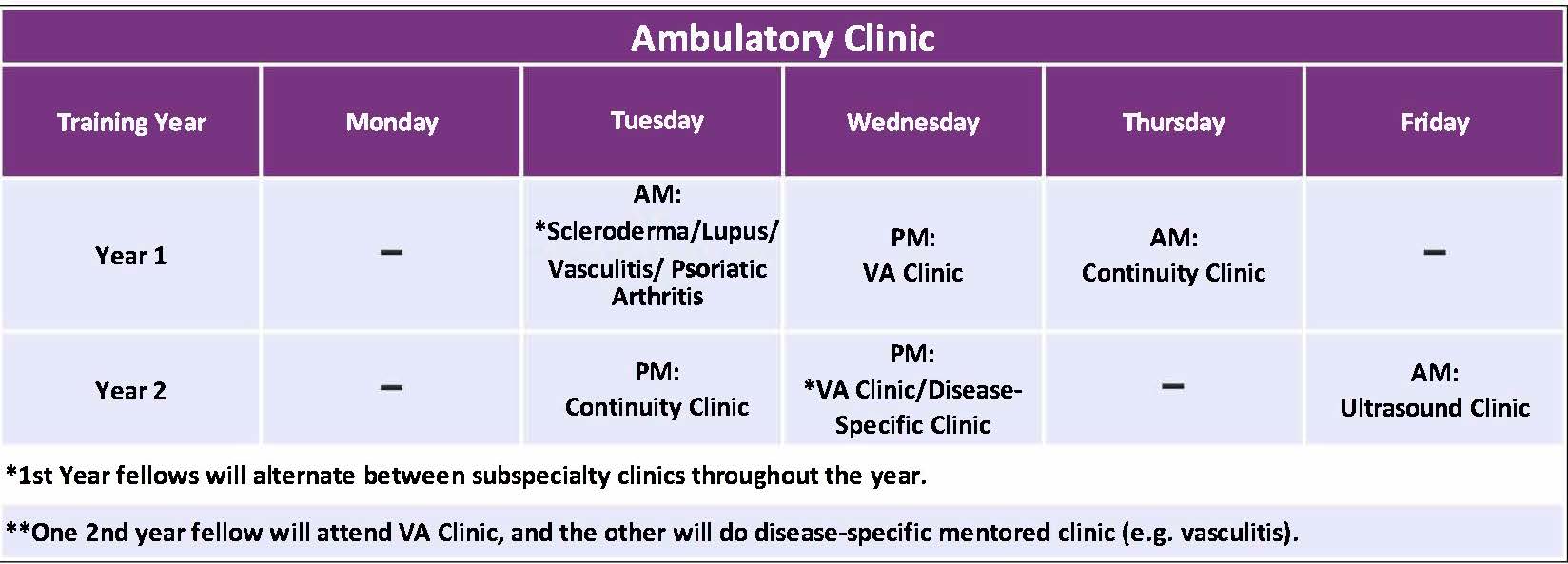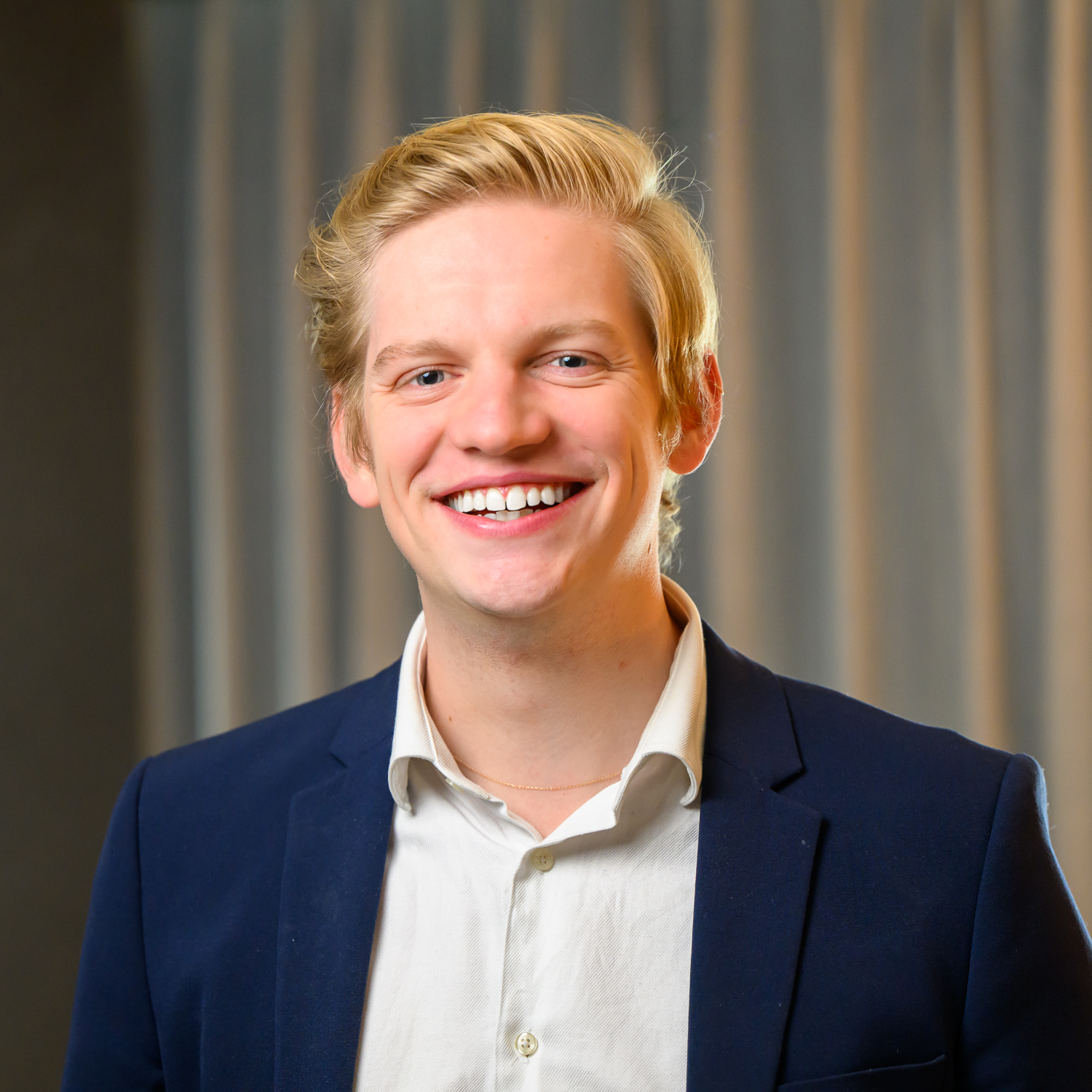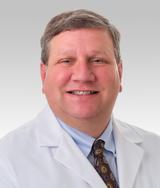Rheumatology Fellowship
The philosophy of the Northwestern Rheumatology fellowship training program is to provide the fellow with the resources necessary to undertake a self-directed learning program that will lead to high-level competence in clinical rheumatology and mentored research training. Additionally, the fellow will obtain training in becoming an educator to prepare them to progress to the next step in providing medical education to learners. The overarching goal of the program is to have the fellow acquire competence in three areas:
- Patient Care
- Research
- Medical Education
Education
GENERAL OVERVIEW
A curriculum has been developed that prepares the fellow for eligibility to sit for the ABIM Certification Examination in Rheumatology after two years of fellowship. A third year of fellowship in a non-ACGME accredited research year is offered. Northwestern University’s Fellowship Program is the recipient of the NIH T-32 Training grant. This grant allows fellows pursuing basic/translational/or clinical research to spend 2 years dedicated to building their research portfolio and prepare fellows to successfully apply for and obtain grants, building a foundation for future careers as physician-scientists.
Year 1 will focus on clinical training. Depending on the fellow's interests, Year 2 emphasizes research or medical education training while continuing the fellow's clinical skills development. Year 3 is available for an immersive research experience.
The following rotations have been established for the purpose of teaching rheumatology fellows the depth and breadth of clinical rheumatology: (a) ambulatory rheumatology experience; (b) inpatient rheumatology experience; (c) ambulatory rotations with other clinical specialties; (d) research experience; (e) didactic conferences; (f) continuing medical education and society participation and (g) development of teaching skills.
DIDACTIC PROGRAM
Fellow Summer Bootcamp
Each summer the faculty in rheumatology present a series of core lectures that introduce and review the clinical manifestations of the various rheumatic diseases.
Rheumatology Grand Rounds
Clinical case presentations and research presentations pertaining to a wide array of rheumatologic and immunologic diseases are presented at this conference by internal faculty, visiting faculty, and fellows.
Clinical Vignettes are presented regularly by a fellow at Rheumatology Grand Rounds. In addition, our FIRST-DailyLife Core Center for Clinical Research - Clinical and Translational Research Incubator Seminar (CCCR-CTRIS) invites multidiscplinary speakers from the Northwestern community to present their research and inspire collaboration.
Fellows Didactic Series
The Fellows Didactic Series consists of lectures on core curriculum topics (primarily given by fellows), Journal Club, Radiology Rounds, Board Review, State of the Art (SOTA) lectures by faculty, Ultrasound Workshop, Difficult Case Conference, and ACR Reading List Review.
Department of Medicine Grand Rounds
Weekly clinical or translational conference for all members of the Department of Medicine.
EDUCATION PATHWAYS, CERTIFICATE PROGRAMS, AND DEGREES
Multiple opportunities exists for more in-depth training for education.
Certificate Programs:
- Clinical Scholars Program Focus areas include Global Health, Medical Education, Bioethics, and Health Equity and Advocacy.
- Academy for Quality, Safety and Improvement (AQSI)
Masters Programs:
Research
The objective of the research training experience during fellowship is to ensure that trainees acquire a core skill set that will allow future functioning as ethical, independent investigators.
Fellows are expected to perform an independent research project where they will develop skills in hypothesis-setting, study design, and data interpretation under the direct supervision of a mentoring faculty member. Decision on a research project needs to begin during the second half of the first year of fellowship, allowing for transition at the start of the second year.
A third research year is available for research-oriented candidates with a desire to continue in academic medicine. Fellows who choose to undertake a third year do not have inpatient duties and are only required to be in the outpatient clinic one half-day each week. The third year is supported by a T32 National Research Service Award, a 15-year grant from the National Institute of Health. With the support of this grant, a number of laboratories at Northwestern University participate in research training opportunities focusing on Rheumatoid Arthritis, Scleroderma and other Rheumatologic research interests. Fellows are provided opportunities for basic science research or for work in the fields of epidemiology and health services research conducted by members of the division.
Learn more about Rheumatology's T32 and Research Opportunities here.
Clinical Experience
Inpatient Rotation
The inpatient rheumatology experience (consult fellow experience) is shared primarily among the first year fellows in 1 month blocks. The weekend coverage is distributed between the 1st and 2nd year fellows. Third-year research fellows have no required inpatient duties, in order to provide sufficient protected time for research.
The fellow is responsible for organizing the activities of the service to include the initial evaluation of inpatients in need of rheumatology consultation, deciding on evaluation and management plans, communicating with the referring health care team, ensuring continuity of care after discharge if needed, and leading the educational efforts for any rotating medical students or residents. The consult team is responsible for care of patients at Northwestern Memorial Hospital and the Shirley Ryan Ability Lab during this period of time. Intrinsic to this rotation is the development and refinement of clinical evaluation skills of patients with rheumatic diseases.
Non-rheumatologic medical management is performed by the managing service, under whom the patient is admitted. During this rotation the attending rheumatologists generally change every week, providing the fellow with exposure over time to all of our clinical faculty in a meaningful environment.
Ambulatory Experience
First-year fellows care for outpatients during three half-days in the outpatient clinic. Fellows are in clinic two half-days in their second year and one half-day in their third year (this may vary depending on the academic track). In each half-day, a fellow is generally responsible for one to two new consultations and four to six follow-up patients. All fellows participate in continuity clinic and subspecialty clinics (lupus, scleroderma, vasculitis, psoriatic arthritis, ultrasound) at the downtown outpatient facility at Northwestern University Feinberg School of Medicine, and all first year fellows spend one half-day continuity clinic at the Jesse Brown VA, under the direct supervision of an attending physician.
The fellow is given progressive autonomy in outpatient care throughout the fellowship, and will be appropriately supervised by assigned attending faculty members. The goal of this experience is for the fellows to gain expertise in the outpatient evaluation and management of rheumatic diseases. The experience provides an opportunity to develop an understanding for the natural history of these conditions over an extended period of time.
Fellows are also provided exposure to other disciplines whose expertise is required in the care of patients with rheumatic diseases. These disciplines include Rehabilitative Medicine, Bone Health, and Pediatric Rheumatology. Additional disciplines (such as Interstitial Lung Disease, Inflammatory Eye Disease, Neuromuscular Disease, Rheumatic Dermatology, Myositis) are available based on fellows' interests. The goal of these experiences is for the fellow to appreciate the approach to the specific conditions that relate to rheumatic disorders within these subspecialties. This interdisciplinary interaction can occur in the form of a clinical rotation, multidisciplinary conference, etc.

Diversity & Inclusion
The Department of Medicine at Northwestern University seeks to attract inquisitive, motivated residents and fellows and is committed to providing them with every opportunity for success. The greatest challenges facing the medical field are complex, and addressing them will require a diverse body of physicians and researchers who can work collaboratively. Northwestern offers unparalleled training and research opportunities and encourages fellowship applications from those who seek to become future leaders in the subspecialties of medicine. We are committed to and inspired by a diverse and inclusive work environment that allows each trainee to achieve their personal goals.
For more information on Northwestern’s commitment to diversity please see the following resources:
Requirements & Eligibility
Applicant qualifications include successful completion of an ACGME-accredited Internal Medicine residency and eligibility for the American Board of Internal Medicine's certification exam prior to the start of fellowship training. Because of support by an NIH National Research Service Award T32 training grant, applicants must be a citizen or a noncitizen national of the United States or have been lawfully admitted for permanent residence at the time of appointment to the grant. Applicants must also be eligible for an unrestricted Illinois medical license prior to beginning training.
Application Process
The McGaw Medical Center of Northwestern University is committed to providing and maintaining a healthy learning environment and educational culture for all house staff, faculty and other members of the McGaw community including patients and employees of affiliated educational institutions and medical facilities. The commitment includes maintaining and educational environment that is free of unlawful discrimination and harassment on the basis of any legally protected status. In accordance with McGaw's educational goals and mission, and applicable law, McGaw does not discriminate or tolerate harassment based on sexual, racial, national origin or any protected group status.
The fellowship application process is managed through ERAS. The 2022 interview process will be entirely virtual in keeping with ACGME recommendations.
Fellowship selection occurs after the interview process and takes place through the NRMP fellowship match program.
Why Northwestern?
Housestaff training through McGaw Medical Center of Northwestern University provides diverse and challenging clinical experiences and world-class education located in the heart of the beautiful city of Chicago. Learn more via the links to the McGaw website below.
Watch Our Videos
McGaw Experience Discover Feinberg Northwestern Medicine Community Partnership Program Learn More About Chicago Get to Know Streeterville
More Information
Further program details, including our Housestaff Manual and a sample training contract, are available on our McGaw Medical Center Graduate Education site. Likewise, we recommend reading through our FREIDA listing (program number 150-16-21-051).
Contact Us

Brian Jaros, MD
Associate Program Director
Rheumatology

Amanda Chio
Fellowship Coordinator
Rheumatology
312-503-0377
Physician-Scientist Training & Resources
We offer a wide range of resources, mentorship opportunities and formal training programs to help our residents and fellows excel as physician-scientists. Explore all of the resources and hear from housestaff who are making research a major part of their career development plans.